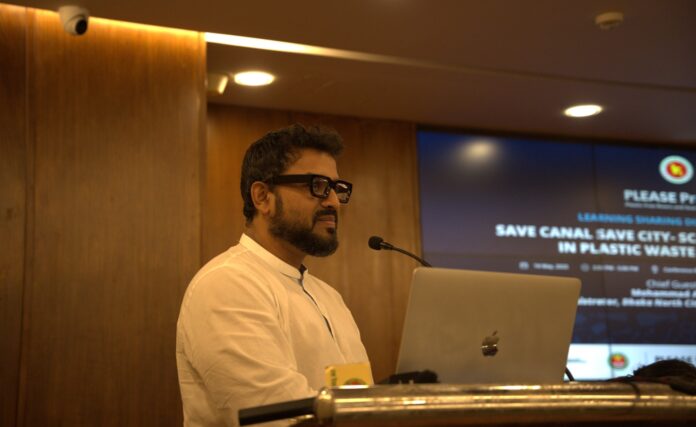“Previously, cleaning the canals cost over Taka 100 crore. Now, we have cleaned more than 100 kilometers of canals for less than Taka 10 crore. That is real change. Many canals have been reclaimed. Suppose schools can be involved through Red Orange Limited. In that case, rapid change is possible”, said Mohammad Azaz, Administrator of Dhaka North City Corporation (DNCC), in his keynote speech at the experience-sharing seminar titled “Save Canal Save City – Scaling Best Practices in Plastic Waste Management”, held today (Wednesday) at the DNCC Nagar Bhaban Conference Room.
The seminar showcased the learnings from a pilot initiative under the Plastic Free Rivers and Seas for South Asia (PLEASE) project, implemented in the Kallyanpur canal area. This initiative is part of innovative efforts to restore urban water bodies and manage plastic waste in Dhaka.
In his remarks, Mohammad Azaz further said, “Starting from June 1, massive-scale activities will begin across Dhaka’s canals, lakes, open spaces, and fields. A citywide land campaign has already been completed. Following advice from botanists, trees will be planted along canal banks. We want all our partners to join us in making these efforts successful.”
The seminar opened with welcome remarks from Commodore ABM Shamsul Alam, Chief Waste Management Officer of DNCC, and Mr. Arnob Chakraborty, Managing Director of Red Orange Limited, who outlined the project’s background and purpose.

Arnob Chakraborty said, “This is a pilot initiative through which we’ve tried to establish a model. We received valuable guidance from the Dhaka North City Corporation. That has been a major achievement for us.”
In a technology-focused presentation, Dr. Mujibur Rahman, Director of CSIRS–UIU and Professor at United International University, along with Jannatul Munia, Director (Strategy) at Red Orange Limited, presented the effectiveness of the floating barrier installed in the Kallyanpur canal.
A session titled “Landscape of Plastic Waste Management: Way Forward of the Learning” was delivered by Brigadier General Md. Moin Uddin, Chief Engineer, DNCC, and Md. Aminul Islam, Chief Engineer, Dhaka South City Corporation, is focusing on the broader implications and potential scalability of such solutions.
Brigadier General Md. Moin Uddin said, “Though we have a 1,200-kilometer drainage system, canal flow exists in only 86 kilometers. Waste dumping into drains and plastic clogging the canals are causing waterlogging and increasing public suffering in the city.”
Following that, in the open discussion session, participants shared their experiences, challenges, and opinions.
The session was attended by special guests, including Air Commodore Md Mahbubur Rahman Talukder, Chief Waste Management Officer, Dhaka South City Corporation (DSCC); Dr. Shibly Sadik, Senior Adviser, Embassy of the Netherlands in Bangladesh; and Shirin Sultana, Partnerships Advisor, UNOPS AR, SAMCO, Bangladesh.
Md Mahbubur Rahman Talukder said, “We collect around 3,200 tons of waste daily, of which 20% is plastic. Among this, 70% is single-use plastic, and 5% is microplastic—areas where very little analysis has been done. These kinds of projects are critical to proving the sustainability of recycling efforts.”
Dr. Shibly Sadik emphasized, “In environmental management, the government, the people, civil society, knowledge institutions, and the private sector must work collaboratively in decision-making. This project is a good example of that approach.”
Ms. Shirin Sultana said, “Another important aspect of our project is financial stability. The revenue model developed by DNCC and Red Orange will create long-term job opportunities for waste workers and enable sustained growth and management of this operation.”
In his closing remarks, Abu Sayed Md. Kamruzzaman, Chief Executive Officer of DNCC, thanked all participants and urged continued collaboration. Only by working together can we achieve sustainable solutions.
Speakers at the event agreed that this experience-sharing seminar would serve as an important platform for developing effective solutions, policy recommendations, and partnership-based initiatives in managing plastic waste in the city.



